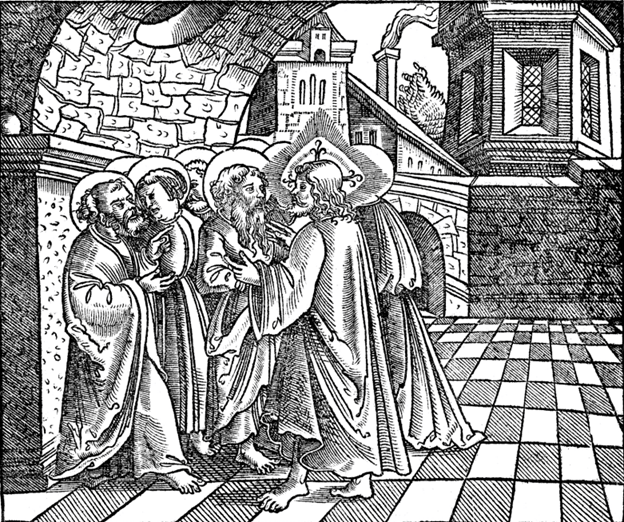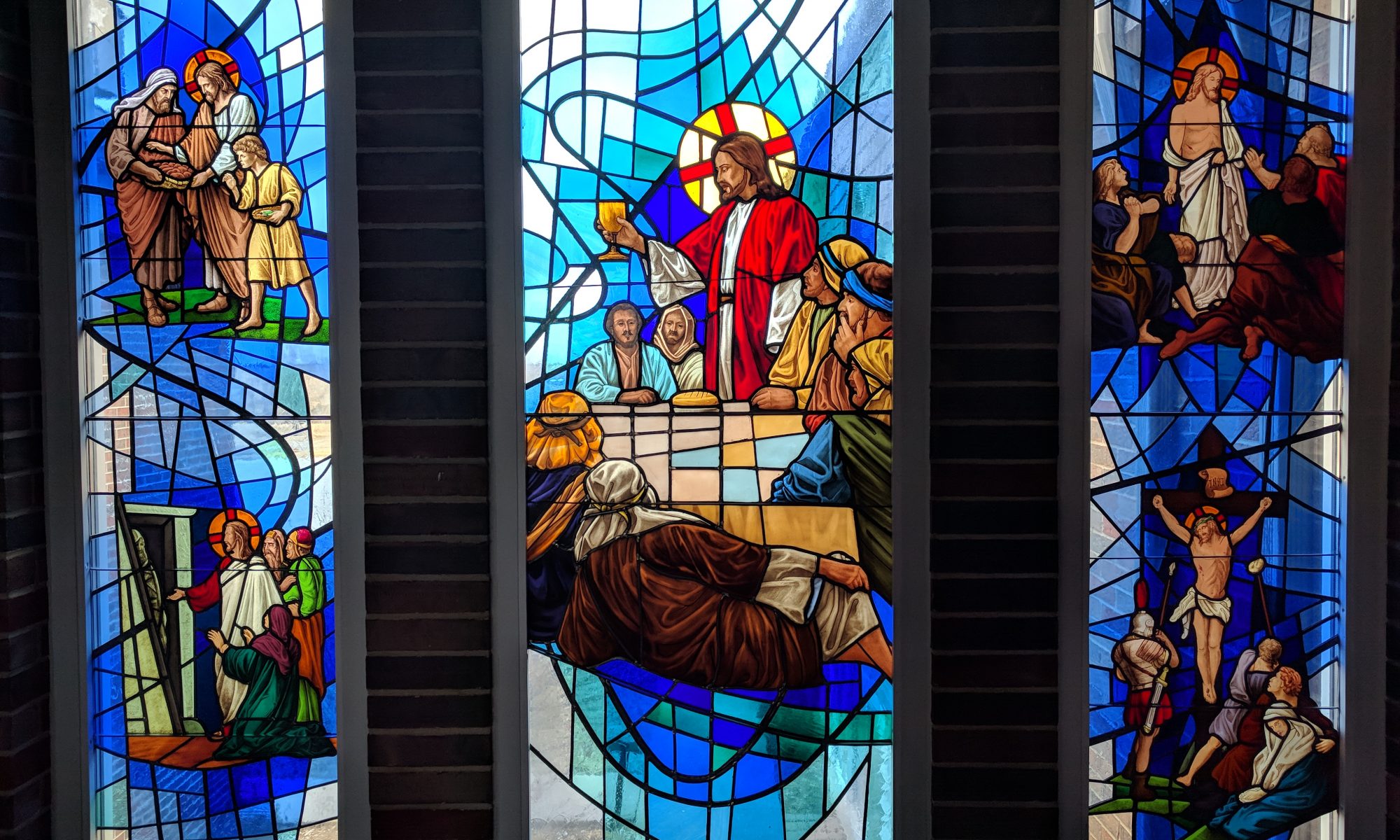
Lessons: Isaiah 40:25-31, 1 Peter 2:11-20, John 16:16-22
Hymns: LSB 487, 459, 483, 633, 475, 480, 477
Grace, mercy, and peace to you from God our Father and our Lord and Savior, Jesus Christ. Amen.
The Collect of the Day is a short prayer that we pray before the Scripture readings. In a sense, the Collect collects the emphasis of the Scripture lessons and makes requests to God. Most of these Collects have been prayed in the Church for many centuries. Such a blessing it is to have these short prayers in the Divine Service! I printed today’s Collect in the bulletin.
The order to most Collects is this: First, they address God. Second, they state something about God. Third, they make a petition, or a request. Fourth, the Collect describes the outcome of the petition. And the Collect terminates by naming the Holy Trinity, who lives forever.
Today’s Collect addresses God as “Almighty God.” The Collect then states what God does. God shows “those in error the light of His truth so that they may return to the way of righteousness.” We petitioned God as we prayed, “Grant faithfulness to all who are admitted into the fellowship of Christ’s Church.” We prayed the outcome is that Christians “may avoid whatever is contrary to their confession and follow all such things as are pleasing to [God].”
God does not want to us to be in darkness, but He wants us to be illumined by His Word through His Son. God wants us to turn from our wicked ways and walk in the way of righteousness. God wants us to abide in His truth.
And so, God sent His Son so that we may become the righteousness of God—so that we may be saved from our sin—so that we can be numbered among the saints.
The verses right before our Epistle lesson attest to this. St. Peter said we were once not a people, but now are a people of God. We once had not obtained mercy, but now we have mercy. We are called out of darkness into His marvelous light. We are a chosen generation, a royal priesthood, a holy nation—God’s own special people (1 Peter 2:9-10). What a blessing God has done this for us, despite our sin!
Yet, our flesh keeps rearing its ugly head. We are tempted to do all sorts of evil. As Peter declares, our flesh wages war against our souls. So, Peter gives us all kinds of instructions (because we are tempted to listen to our flesh, rather than walk in the way of godliness). Peter teaches us to have honorable conduct—even when we are around those who are not believers. He tells us to obey the government. He instructs us to use the freedom we have in the Gospel not to serve as a coverup for evil, but instead to live as servants of God (1 Peter 2:11-20).
After all, we have prayed that God would grant us faithfulness and that we may avoid whatever is contrary to our confession and follow all such things that are pleasing to God.
Left to our own, we would be unable to fulfill our own prayer.
Left to our own, we are unable to do what Peter instructs in our Epistle. We are weak, broken, and fail at resisting our flesh; we cannot make all temptation go away. On our own, we would be filled with sorrow.
That’s why Jesus did what He did for us and for our salvation. Leaving His throne above, He came down to Earth—born of a virgin to redeem those who are under the Law. Jesus came to bear our sin in His own body and went to the cross to pay for the sin of the world. By reconciling man to God, Jesus gives us access to our Father in Heaven and makes it possible for us mortals to live to all eternity.
Jesus describes some of what He had to do in today’s Gospel. In John 16, Jesus is with His disciples on Maundy Thursday. He had already instituted the Lord’s Supper. They have not yet gone to the Garden of Gethsemane where Jesus prays, His disciples fall asleep, and Jesus is arrested to be crucified. Jesus’ words in our Gospel are about His upcoming crucifixion and what this will do to His disciples. They see Him, but in a little while they will not see Him. Sorrow will fill their hearts. But then they will see Him in a little while and they will be filled with joy.
Later that night, they will begin to see the fulfillment of Jesus’ words. They will watch His arrest in the Garden. They will witness His false trial and beating in Jerusalem. They will see Him as He is taken to Golgotha to be crucified. Clearly, they will be filled with sorrow during these events.
But then they will also witness the Resurrection of Christ. Their anguish will turn to joy. They will see Him several times between His Resurrection and Ascension. They will see that Jesus rose bodily. They will rejoice that He lives in body and soul.
This is important for us as Christians. All around us we see death and decay. We lay our loved ones to rest in cemeteries. But the Easter message tells us something important—that this body does not end in death. Instead, just as Christ rose bodily from the grave, so shall we. God did not create Adam and Eve as spirits. He created them as humans—perfect humans with bodies and souls. And so, when Jesus returns in glory, He will raise all the dead—bodily. We confess this truth in the Creed: “I look for the resurrection of the dead and the life of the world to come.” All who believe in Christ will receive the gift of everlasting life. They will be ushered into His eternal kingdom. But all who do not believe in Christ will be punished eternally in Hell.
While we wait for Jesus to return, we live in a world filled with sorrow and hardship. While there are many joys to this life—for God has given us our lives—we realize that this life is corrupted with sin and death. But, just as the disciples’ sorrow turned to joy, so does ours. For Christ Jesus has not left us alone but has come to us with His gifts. He teaches us His Word. He showers us with His love. He grants us His peace. He takes our sin away. He covers us with His very righteousness. He is present among us.
And so, we have holy joy as God’s dear children, whom He purchased with the Blood of Christ.
We rejoice in these truths. And we want to guard these truths, not by hiding them, but by repeating them without mixing God’s truth with human opinon. Remember today’s Collect: Grant faithfulness that we may avoid whatever is contrary to our confession.
We don’t pray to be true or faithful to ourselves, for that is idolatry of the self. We pray to be faithful to God, for He made us, redeemed us, and sanctifies us.
To walk in His ways, we must always be asking ourselves what God’s Word teaches, what His will is, and how our devotion to Him may increase.
God grants faithfulness through His Word. That is, God’s Word works faith in us. God has also given us the visible Word to work faith in us. Baptism is how God adds us to His family. And God strengthens our faith through Holy Communion.
Seven years ago here at Grace, we recovered the practice of offering the Lord’s Supper each Sunday. After having a Lenten Series on the Sacrament and much discussion that began years before I arrived, the congregation began offering the Lord’s Supper to God’s people each week. It is a blessing to have this practice.
You see, weekly Communion is the historic practice of the Church. Offering it less often was an innovation that arose a couple of centuries ago for various reasons. Our Lutheran Confessions state that we retain the Lord’s Supper on Sunday (AC XXIV 1). The pattern for Church is set in these words of Acts 2:42 right after Pentecost: “And they devoted themselves to the apostles’ teaching and the fellowship, to the breaking of bread and the prayers” This verse outlines faithfulness and following the way that is pleasing to our Lord.
The angels in Heaven rejoice when one sinner repents (Luke 15:10). When we go to the Lord’s altar, we do so in repentance, desiring to be forgiven by our Savior. We kneel to receive His gifts—to commune with God and with one another—to receive His Body and Blood for our peace. Consider the great joy it is to go to the Lord’s altar and commune with Christ!
Because the Lord’s Supper is God’s gift of the Gospel, we do not turn it into a Law. No one is being force-fed to receive it too often. Receive it as often as you are comfortable. Rejoice with those who go forward to receive it often, for they are receiving the Body and Blood of Christ for their forgiveness. God is strengthening their faith. That is, God is granting faithfulness to them and following all such things as are pleasing to our Lord.
The disciples were sorrowful when they could not see their Lord. Yet, they were filled with joy when they saw Him again. We are also blessed to be in the presence of Christ, not only through the Word, but also through the Sacrament. It is my prayer that you may be filled with joy to have to partake of the Sacrament frequently.
Is this not the outcome that we prayed for in today’s Collect, as we prayed that Christians “follow all such things as are pleasing to” God? It certainly pleases Him when we receive His gifts for our great benefit, just as it pleases us when others receive our gifts them.
God bless you continually as you walk in the light of His truth and in the way of righteousness! God bless you in the joy of the Resurrection! Amen.
The peace of God which passes all understanding keep your hearts and minds in Christ Jesus to life everlasting. Amen

